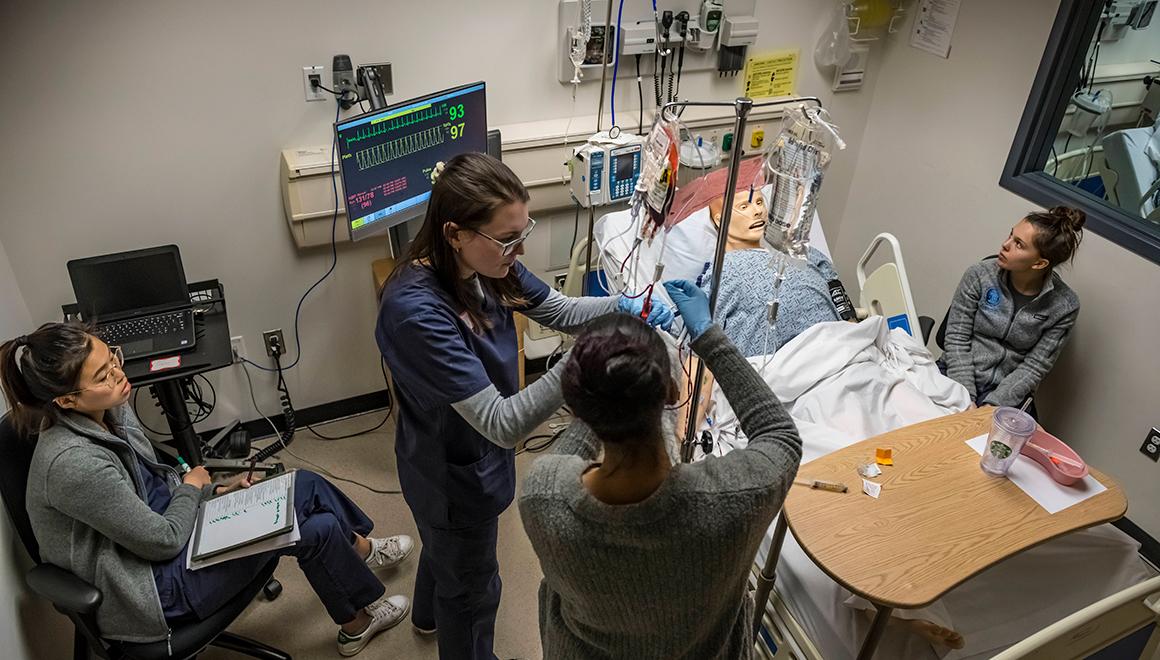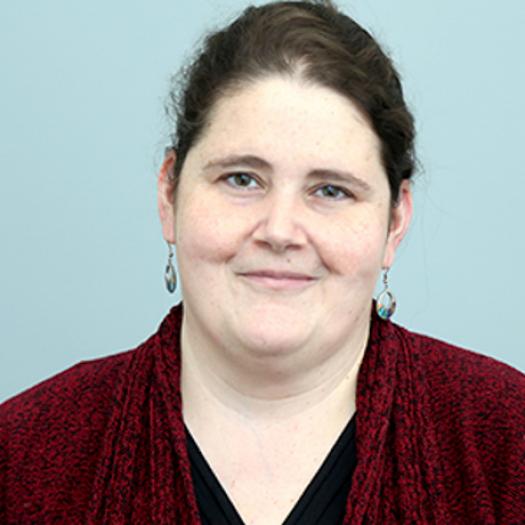- Home
- Graduate
- Academic Programs
- Nursing: For BSN Holders
Earn your Master of Science in Nursing (BSN to MSN degree) from Simmons University
Our 2-year Master of Science in Nursing (BSN to MSN degree) program is designed for Registered Nurses (RNs) who wish to advance their careers.

What is the value of a Master’s of Science in Nursing degree?
Right now, the world needs advanced practice nursing professionals more than ever before. Nursing professionals are integral pieces of the healthcare system and their work has an impact on the health of our country.
By becoming an FNP, nurses may increase their earning potential in a field that the Bureau of Labor Statistics has projected to grow 52.4% between 2019 and 2029. Nurses can also gain a sense of accomplishment and satisfaction by expanding their scope of practice in a career that is consistently ranked one of the best jobs in health care.
Graduates of Simmons’ Master’s of Science in Nursing (MSN) program are prepared to take the family nurse practitioner certification exam, and find success in positions in primary health care and community care settings, private practice, and in Doctor of Nursing Practice (DNP) programs.
Simmons offers both on-campus and online options to complete your Master’s of Science in Nursing. In addition to our campus-based BSN to MSN program, we also offer an online BSN to MSN program, an online program that allows Registered Nurses (RNs) to earn their Master of Science in Nursing (MSN) degree in just 3 years, and a Direct Entry Master of Science in Nursing – Family Nurse Practitioner (FNP), designed for students from all academic backgrounds looking to pursue a Master’s of Science in Nursing degree.
Learning outcomes for the MSN degree
Our Master’s of Science in Nursing provides Registered Nurses (RNs) the opportunity to advance their careers and become Family Nurse Practitioners (FNPs).
Faculty in our MSN degree program are passionate educators, clinicians, and researchers, and our location in Boston’s renowned medical area provides unparalleled student training for our campus-based students. Learn more about our MSN program requirements.
Boston-based students in our Master’s of Science in Nursing degree program have access to more than 200 clinical training sites, including world-class institutions like Massachusetts General Hospital, Brigham and Women’s Hospital, Boston Children’s Hospital, and Dana-Farber Cancer Institute.
Students in our online BSN to MSN degree program complete clinical training in their communities nationwide, with over 6,000 sites, led by a team of 20+ regional placement specialists.
The BSN to MSN program’s admission requirements
Our BSN to MSN program consists of three components - foundational courses, primary care, and research. This 2-year program prepares students to deliver primary health care to diverse populations across their lifespan.
Applicants to the MSN degree program must have a current United States unencumbered RN license in good standing and a bachelor’s degree from a regionally accredited U.S. college or university with a preferred GPA of at least 3.0 on a 4.0 scale
Learn more about applying to Simmons University’s master’s in Nursing program.
What can you do with a master’s in Nursing?
Our Master’s of Science in Nursing program prepares students to become Family Nurse Practitioners (FNP). We focus on this area because the current and future US population is in great need of qualified advanced practice nurses who can fill the gap in the primary care setting, for which there is a critical national shortage.
Students in our Master’s of Science in Nursing program are educated to provide compassionate and evidence-based care, advocate for patients and communities, lead interprofessional teams, and advance research. Simmons graduates also perform well above the national average on certification exams.
Graduates of our MSN degree program work in every area of health care, and are recognized for clinical excellence. Programs culminating in a master’s in Nursing prepare graduates for a range of rewarding roles, including FNP, clinical researcher, and public health nurse.
Learn more about our MSN degree!
Ready to take your nursing career to the next level with our BSN to MSN degree program? Apply now or request more information today!
Description
The program is designed for registered nurses with bachelor's degrees in nursing who wish to advance their careers with a graduate degree in nursing. The MSN consists of three components – foundational courses, primary care, and research. We prepare students to deliver primary health care to diverse populations across the lifespan. You will focus on health promotion and education, disease prevention, and learn to assess and manage patients with acute and chronic illnesses.
Graduates of this program are prepared to take the family nurse practitioner certification exam, and find success in positions in primary health care and community care settings, private practice, specialty medicine, public health, academia, and beyond. Graduates of this program are also prepared to enter Doctor of Nursing Practice (DNP) or PhD programs to further advance their careers.
The FNP MSN for Bachelor’s prepared nurses is offered on campus in Boston and online via Nursing@Simmons.
Admissions Requirements
Applicants to the BS-MSN program must have a current unencumbered/unrestricted United States RN license in good standing and a BSN or BS with a major in nursing from a regionally accredited U.S. college or university.
Statistics Prerequisite: Applicants must have taken an undergraduate statistics course at a regionally accredited U.S. post-secondary institution within 7 years prior to the application deadline. The course must be equal to a semester in length and a grade of B or better is required. The course may be in progress at the time of application and must be completed before the start of the program.
FNP MSN Course Prerequisite and Corequisite Rules
(Direct Entry and RN to MSN students should consult additional pre- and co-requisite rules noted in those sections, below.)
-
Advanced Pathophysiology (404): Students must successfully complete CHSO 404 prior to attempting NURP 424 and NURP 530.
-
Advanced Pharmacology (424) & Advanced Health Assessment (530): Students must pass the 3Ps (courses outlined above), prior to entering their didactic primary care courses, immersion weekend and clinical courses.
-
FNP I Primary Care Nursing of the Child Bearing Family (531) & FNP II Primary Care Nursing (532): Students can take these courses as corequisites; Students must successfully complete their 3Ps prior to taking these courses
- FNP III Primary Care Nursing (533): Students .must successfully complete their 3Ps prior to taking this course; Students must successfully complete FNP I Primary Care (531) and FNP II Primary Care Nursing (532) prior to taking FNP III Primary Care Nursing (533).
- Immersion Weekend (534): Students must successfully complete their 3Ps, 531, 532 and must be currently enrolled in 533 (or already have successfully completed 533) in order to be eligible to attend Immersion Weekend (NURP/NURS 534).
- FNP Clinical Decision Making I (535): Students must successfully complete all required didactic courses, except NURP/NURS 411 - Scholarly Inquiry, prior to taking FNP Clinical Decision Making I (535).
- FNP Clinical Decision Making II (536): Students must successfully complete their 3Ps, 531, 532, 533, 534, and 535 prior to taking FNP Clinical Decision Making II (536).
- Scholarly Inquiry (411): Students must pass Research Methods (410) before taking Scholarly Inquiry (411).
FNP MSN Clinical Placement
- Placements occur during the final two terms of the program, 535 & 536.
- Clinical education covers related content in two settings: mastery of didactic knowledge in the academic setting and application of didactic knowledge to practice in clinical settings.
- Students will attend their clinical placement approximately 24 hours per week for two 14-week terms to complete a minimum of 672 clinical hours.
Clinical education carries a total of 12 credits.
Online Full-Time Sequence
Term One
| CHSO404 | Advanced Pathophysiology | 3 |
| NURP589 | Evidence-Based Practice: Informatics | 2 |
| NURP570 | Health Promotion Global Perspective | 2 |
| NURP 402 | Role of the Advanced Practice Nurse | 1 |
Term Two
| NURP424 | Advanced Pharmacology Across the Lifespan | 3 |
| NURP530 | Advanced Health Assessment Across the Life Span | 3 |
| NURP450 | Health Care System: Interdisiplinary Perspectives | 3 |
Term Three
| NURP531 | FNP I Primary Care Nursing | 3 |
| NURP532 | FNP II Primary Care Nursing | 3 |
| NURP505 | Family Theory: Health & Illness | 2 |
Term Four
| NURP533 | FNP III Primary Care Nursing | 3 |
| NURP534 | Immersion & Clinical Qualification Course | 1 |
| NURP410 | Research Methods | 3 |
Term Six
| NURP536 | FNP Clinical Decision Making II | 6 |
Online Part-time Sequence
Term One
| CHSO404 | Advanced Pathophysiology | 3 |
| NURP589 | Evidence-Based Practice: Informatics | 2 |
| NURP 402 | Role of the Advanced Practice Nurse | 1 |
Term Two
| NURP424 | Advanced Pharmacology Across the Lifespan | 3 |
| NURP530 | Advanced Health Assessment Across the Life Span | 3 |
| NURP570 | Health Promotion Global Perspective | 2 |
Term Three
| NURP531 | FNP I Primary Care Nursing | 3 |
| NURP450 | Health Care System: Interdisiplinary Perspectives | 3 |
Term Five
| NURP410 | Research Methods | 3 |
| NURP533 | FNP III Primary Care Nursing | 3 |
| NURP534 | Immersion & Clinical Qualification Course | 1 |
Term Seven
| NURP536 | FNP Clinical Decision Making II | 6 |
On Campus Full-Time Sequence
Students complete 48 course credits.Year 1 Fall
| NURS589 | Evidence-Based Practice: Informatics | 2 |
| NURS 570 | Health Promotion Global Perspective | 2 |
| CHSC404 | Advanced Pathophysiology | 3 |
| NURS402 | Role of the Advanced Practice Nurse | 1 |
Year 1 Spring
| NURS424 | Advanced Pharmacology Across the Lifespan | 3 |
| NURS530 | Advanced Health Assessment Across the Lifespan | 3 |
| SNHS450 | Health Care System: Interdisciplinary Perspectives | 3 |
Year 1 Summer
| NURS531 | FNP I Primary Care Nursing | 3 |
| NURS532 | FNP II Primary Care Nursing | 3 |
| NURS505 | Family Theory: Health and Illness | 2 |
Year 2 Fall
| NURS533 | FNP III Primary Care Nursing | 3 |
| NURS534 | Immersion & Clinical Qualification Course | 1 |
| NURS410 | Research Methods | 3 |
Year 2 Summer
| NURS536 | FNP Clinical Decision Making II | 6 |
On Campus Part-Time Sequence
Year 1 Fall
| NURS589 | Evidence-Based Practice: Informatics | 2 |
| CHSC404 | Advanced Pathophysiology | 3 |
| NURS402 | Role of the Advanced Practice Nurse | 1 |
Year 1 Spring
| NURS424 | Advanced Pharmacology Across the Lifespan | 3 |
| NURS530 | Advanced Health Assessment Across the Lifespan | 3 |
| NURS 570 | Health Promotion Global Perspective | 2 |
Year 1 Summer
| NURS531 | FNP I Primary Care Nursing | 3 |
| SNHS450 | Health Care System: Interdisciplinary Perspectives | 3 |
Year 2 Spring
| NURS533 | FNP III Primary Care Nursing | 3 |
| NURS534 | Immersion & Clinical Qualification Course | 1 |
| NURS410 | Research Methods | 3 |
Year 3 Fall
| NURS536 | FNP Clinical Decision Making II | 6 |
Description
This on campus program is designed for students from all academic backgrounds. Whether your degree is in psychology, chemical engineering or English, once you have completed the prerequisite courses for admission, you will be on your way to an MS in Nursing.
Students complete the pre-licensure Nursing curriculum full time on campus for the first four semesters of the program. You will learn from leaders in Nursing and Health Care and be prepared for the registered nurse (NCLEX) exam. Upon passing, you will move into the graduate portion of the program, which consists of three components – foundational courses, primary care, and research. We prepare students to deliver primary health care to diverse populations across the lifespan. Graduates of this program are prepared to take the family nurse practitioner (FNP) national board certification exam (AANP or ANCC). Our students find success in positions in primary health care, community care settings, specialty medicine, public health, academia and beyond. Graduates of this program are also prepared to enter Doctor of Nursing Practice (DNP) programs or PhD programs to further advance their careers.
Admissions Requirements
Applicants must have a BS or BA from a regionally accredited US college or university or a post-secondary institution abroad which is recognized by the Ministry of Education in the home country in a discipline other than Nursing to apply.
Prerequisites:
All prerequisite courses must have been completed within ten years prior to the application deadline; all must have grades (pass/fail or audit courses, AP (Advanced Placement), IB or CLEP scores do not fulfill prerequisites) and all must have been taken at a regionally accredited institution or at a post-secondary institution abroad recognized by the Ministry of Education in the home country.
A cumulative GPA (of all institutions attended) of 3.0 and a 3.0 in all prerequisites. Prerequisite courses (based on semester systems) required for admission:
- Statistics: One semester of statistics, can be taken in a math, psychology or science department. Course content must include principles of probability, binomial and normal distributions, sample statistics, estimation and testing of hypotheses and linear regression and correlation.
- Developmental Psychology: One semester of developmental psychology. Course content must span birth to death; general psychology does not meet this requirement. A series of appropriate courses in combination could fulfill the prerequisite, such as prenatal to adolescence, young-middle adulthood, aging and dying.
- Microbiology: One semester of microbiology with a lab.
- Human Anatomy and Physiology: Two semesters of human anatomy and physiology with lab. Animal physiology will not meet this requirement.
- Inorganic Chemistry: One semester of inorganic chemistry with lab. (Usually General Chemistry I and II will fulfill the inorganic and organic chemistry prerequisites).
- Organic Chemistry: One semester of organic chemistry with lab. (Usually General Chemistry I and II will fulfill the inorganic and organic chemistry prerequisites.
FNP MSN Direct Entry Pre-Licensure Clinical Placement
Placements occur during NURS 448, NURS 419, NURS 426, NURS 438, NURS 449, NURS 447, NURS 487
Direct Entry Prerequisite and Corequisite Rules
DE Pre-Licensure Courses: DE students must take pre-licensure courses in the sequence in which they are listed. No variation is allowed.
NURS 438: Students must pass NURS 426 before they can take NURS 438.
NURS 426: Students must pass or be enrolled in CHSC 404 and NURS 435 before they can take NURS 426.
Direct Entry Pre-Licensure Sequence
Year 1 Fall
| NURS426 | Variances in Health Patterns of Adults and Elders I | 2 |
| NURS435 | Integrated Pharmacology & Pathophysiology | 4 |
| NURS494 | Nursing Fundamentals & Health Assessment | 4 |
| CHSC404 | Advanced Pathophysiology | 3 |
Year 1 Spring
| NURS438 | Advanced Medical Surgical Nursing | 6 |
| NURS448 | Variances in Health Patterns of Clients with Psychiatric and Mental Illness | 4 |
| SNHS450 | Health Care System: Interdisciplinary Perspectives | 3 |
Year 1 Summer
| NURS447 | Variances in Health Patterns of the Childbearing Family | 4 |
| NURS449 | Variances in Health Patterns of the Childrearing Family | 4 |
| NURS487 | Nursing Care of Individuals, Families, and Communities | 4 |
Year 2 Fall
| NURS455GR | Clinical Decision Making & Complex Care | 4 |
| NURS495 | Contemporary Issues & Role Development for Advanced Practice Nursing | 4 |
| NURS589 | Evidence-Based Practice: Informatics | 2 |
| NURS419 | Clinical Capstone Practicum | 2 |
| NURS469 | Caring at the End of Life | 4 |
NCLEX
*All students must pass and submit proof of passing the NCLEX before starting the second term (Year 2 Summer) of the post-licensure portion of the program.
The Direct Entry MSN program for BA/BS Holders is 96 credits.
Direct Entry Post-Licensure Full-Time Sequence
Year 2 Spring
| NURS424 | Advanced Pharmacology Across the Lifespan | 3 |
| NURS530 | Advanced Health Assessment Across the Lifespan | 3 |
| NURS402 | Role of the Advanced Practice Nurse | 1 |
Year 2 Summer
| NURS531 | FNP I Primary Care Nursing | 3 |
| NURS532 | FNP II Primary Care Nursing | 3 |
| NURS505 | Family Theory: Health and Illness | 2 |
Year 3 Fall
| NURS533 | FNP III Primary Care Nursing | 3 |
| NURS534 | Immersion & Clinical Qualification Course | 1 |
| NURS410 | Research Methods | 3 |
| NURS 570 | Health Promotion Global Perspective | 2 |
Year 3 Summer
| NURS536 | FNP Clinical Decision Making II | 6 |
Direct Entry Post-Licensure Part-Time Sequence
Year 2 Spring
| NURS424 | Advanced Pharmacology Across the Lifespan | 3 |
| NURS530 | Advanced Health Assessment Across the Lifespan | 3 |
| NURS402 | Role of the Advanced Practice Nurse | 1 |
Year 3 Spring
| NURS533 | FNP III Primary Care Nursing | 3 |
| NURS534 | Immersion & Clinical Qualification Course | 1 |
| NURS410 | Research Methods | 3 |
Year 4 Fall
| NURS536 | FNP Clinical Decision Making II | 6 |
This PMHNP MSN is intended for currently licensed Registered Nurses who hold a BS with a major in nursing or a BSN and desire to become Advanced Practice Registered Nurses - Psychiatric Mental Health Nurse Practitioners.
The goal of the Psychiatric Mental Health Nurse Practitioner (PMHNP) track is to graduate Advanced Practice nurses who specialize in the care of children through older adult patients to promote health and treat those living with psychiatric and mental health conditions. Psychiatric Mental Health Nurse Practitioners are critical in all clinical settings and are a key component to assisting with closing the gap around the mental health provider shortage, particularly among patients being able to adequately access psychiatric prescribers. PMHNPs assess, diagnose, treat, and manage issues related to mental health and substance abuse. PMHNPs will effectively partner with patients and their families and interdisciplinary colleagues to promote mental health and well-being.
The program has been created in line with the standards for advanced practice nursing graduate education by the American Association of Colleges of Nursing, the National Organization for Nurse Practitioner Faculties Core and Mental Health Specialty competencies, National Task Force on Quality Nurse Practitioner Education, and American Psychiatric Association practice guidelines, all of which combined ensure that nurse practitioners graduate with a comprehensive background in medical sciences on top of their nursing background.
Clinical Courses for PMHNP
- NURP 545: PMHNP Clinical Decision Making I (6 Credits)
- NURP 546: PMHNP Clinical Decision Making II (6 Credits)
Certification
Students who complete this MSN PMHNP program will be eligible to sit for the national Psychiatric Nurse Practitioner board certification exam with ANCC to become a PMHNP-BC and licensed by state boards of nursing across the US for practice. The program prepares students to also obtain a DEA number for prescriptive authority based on state rules and regulations.
Online Full-time PMHNP Sequence
Term One
| NURP404 | Advanced Pathophysiology | 3 |
| NURP570 | Health Promotion Global Perspective | 2 |
| NURP589 | Evidence-Based Practice: Informatics | 2 |
| NURP 402 | Role of the Advanced Practice Nurse | 1 |
Term Two
| NURP424 | Advanced Pharmacology Across the Lifespan | 3 |
| NURP530 | Advanced Health Assessment Across the Life Span | 3 |
| NURP450 | Health Care System: Interdisiplinary Perspectives | 3 |
Term Three
| NURP426 | Clinical Psychopharmacology Across the Lifespan | 3 |
| NURP540 | Neurobiology & Differential Diagnosis of Mental Disorders | 2 |
| NURP541 | PMHNP I: Psychotherapy Across the Lifespan | 2 |
| NURP542 | PMHNP II: Diagnosis & Management | 2 |
Term Four
| NURP410 | Research Methods | 3 |
| NURP543 | PMHNP III: Diagnosis & Management | 3 |
| NURP544 | PMHNP IV: SMI & Addictions Medicine | 2 |
| NURP 534P | PMHNP Immersion & Clinical Qualification Course | 1 |
Online Part-time PMHNP Sequence
Term One
| CHSO404 | Advanced Pathophysiology | 3 |
| NURP589 | Evidence-Based Practice: Informatics | 2 |
| NURP 402 | Role of the Advanced Practice Nurse | 1 |
Term Two
| NURP424 | Advanced Pharmacology Across the Lifespan | 3 |
| NURP530 | Advanced Health Assessment Across the Life Span | 3 |
Term Three
| NURP426 | Clinical Psychopharmacology Across the Lifespan | 3 |
| NURP450 | Health Care System: Interdisiplinary Perspectives | 3 |
| NURP540 | Neurobiology & Differential Diagnosis of Mental Disorders | 2 |
Term Four
| NURP410 | Research Methods | 3 |
| NURP541 | PMHNP I: Psychotherapy Across the Lifespan | 2 |
| NURP542 | PMHNP II: Diagnosis & Management | 2 |
Term Five
| NURP543 | PMHNP III: Diagnosis & Management | 3 |
| NURP544 | PMHNP IV: SMI & Addictions Medicine | 2 |
| NURP570 | Health Promotion Global Perspective | 2 |
| NURP 534P | PMHNP Immersion & Clinical Qualification Course | 1 |
Term Six
| NURP545 | PMHNP Clinical Decision Making I | 6 |
Term Seven
| NURP546 | PMHNP Clinical Decision Making II | 6 |
The Psychiatric Mental Health Nurse Practitioner MSN program is 47 credits.
Put Knowledge into Practice
Clinical and research are key components of our nursing programs. You'll have opportunities to explore your interests, build your skills and develop mentoring relationships with leaders in the field.
Our students put their knowledge into practice in many ways, including:
- 770 clinical hours over four semesters at a variety of settings – hospitals, clinics, community-based health centers, nursing homes – and with diverse populations across the lifespan, including pediatrics, women’s health, adult and geriatric care.
- Collaborate with faculty or community agencies to develop and implement scholarly research projects.
Licensure
This information is provided in good faith to applicants as of May 27, 2020.
Simmons University is recognized by both the Commission on Collegiate Nursing Education (CCNE) and the Massachusetts Board of Registration in Nursing. Per CCNE guidelines, the graduate level courses address advanced practice registered nurse (APRN) care content specific to the role and population focus of the program. Upon completion of the program, students will be eligible for examination to earn national certification as a FNP via the American Academy of Nurse Practitioners (AANP) or the American Nurses Credentialing Center (ANCC) which will allow graduates to apply for state specific licensure. Scope of practice, exam eligibility, background checks, and even coursework requirements outside the scope of the program may vary by state. Prospective and current students are encouraged to research the requirements for licensure specific to their current or intended state of practice to ensure that our program meets their state licensure requirements. Please find here a state by state breakdown of comparable requirements, including a determination of eligibility for examination. This information provided is designed as a baseline determination of whether the program meets individual state specific requirements.
Online MSN Program for BSN Holders
Our Faculty
Patricia Rissmiller
Associate Professor

Sarah Desmond
Adjunct Faculty

Susan Duty
Emerita

Sarah Volkman
Professor
